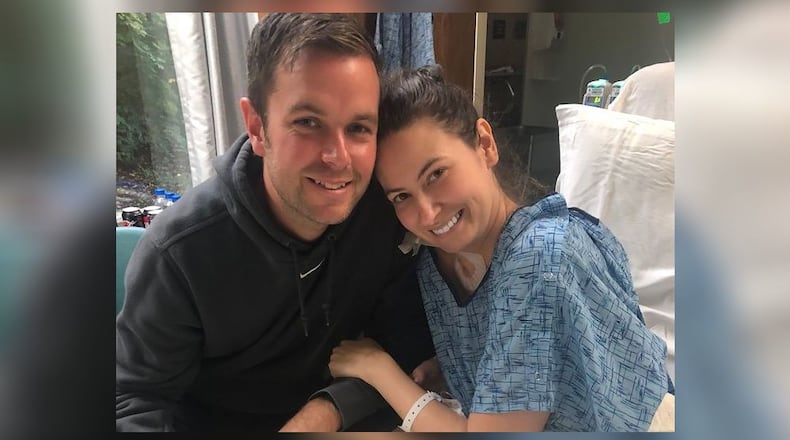A social worker and counselor by trade, Ward was not only working hard preparing for her pageant competition, but she also was working full time with abused and neglected children.
“I was in court at least four times a week,” Ward said. “I was responsible for going into homes and oftentimes removing kids against their parents’ wishes, just to keep them safe.”
Pageant prep involved two-hour daily workouts, dress fittings, walking, talent and interview lessons and meal prepping. Ward said she didn’t realize how high her stress level had become.
“I noticed that I started to get nausea and headaches that lingered on for days,” Ward said. “The pain was almost nonstop.”
Ward assumed she was having migraines caused by stress and lack of sleep. But the pain of the headaches became unbearable.
“I locked myself in a dark room hoping to minimize the headache,” Ward said. “I woke up and sat on the couch with my husband, Dean, and brought my laptop.”
As she was working, Ward’s vision began to blur, and the room appeared to be spinning. She decided she was just overtired, but then she heard a popping sound from inside of her own head.
“After that, it was hard to swallow and breathe for a second,” Ward said. “That’s when I knew something terrible was happening.”
Ward tried to tell her husband that something was wrong, but she could neither move nor speak. Eventually she was able to move enough to throw her laptop and speak nonsense words. Her husband couldn’t understand her but knew enough to rush her to the nearest hospital.
“If you don’t know signs and symptoms of a stroke, you may think the person is just joking around,” Ward said.
At the hospital, Ward was unable to say or type her Social Security number and numbers and letters suddenly looked like a foreign language. Her blood pressure had fallen to a dangerously low level.
“I could tell by the looks on everyone’s faces that they were terrified,” Ward said. “They couldn’t figure out how someone as young as me could be having a stroke.”
Ward was, in fact, experiencing a stroke so severe that said she needed to be transported to another hospital immediately for surgery to save her life. Doctors removed several clots from her brain, but her carotid artery was completely occluded and damaged permanently. Her prognosis for survival was poor.
Throughout Ward’s monthlong stay in the intensive care unit, she underwent five clot removal surgeries and miraculously, she not only survived, but slowly began to improve.
“I had to learn how to chew and swallow again,” Ward said. “I couldn’t move my hands or fingers at first and I had to learn how to write and how to speak.”
Eventually, Ward was able to return home and began intensive therapy every day for nine months. Recovery was slow, but eventually she was able to function again.
“I will never be completely back to normal,” Ward said. “But I have learned how to cope and navigate my deficits.”
Though professionals said that her stressful life is what caused the stroke to begin with, Ward was determined to go back to work. A specialist said a carotid artery dissection caused by her habit of popping her neck to relieve tension was ultimately the culprit.
“When I was in the middle of my second brain surgery, I decided that if I survived, I would spend the rest of my life making people aware of stroke and symptoms, so they don’t have to go through what I did,” Ward said.
And today, that’s exactly what she is doing. She resigned from her therapist job and is today working full time at the same hospital that treated her stroke three years ago. She also is preparing to compete in the Mrs. International Pageant this July. Her platform is “Stroke of Luck,” and she is working with several stroke focused organizations to help educate people about prevention.
“Now, I make myself a priority,” Ward said. “My life was almost cut short at the age of 30 when I was living to survive. Now my focus is to do more of what brings me joy and I live to thrive.”
Contact this contributing writer at banspach@ymail.com.
About the Author




